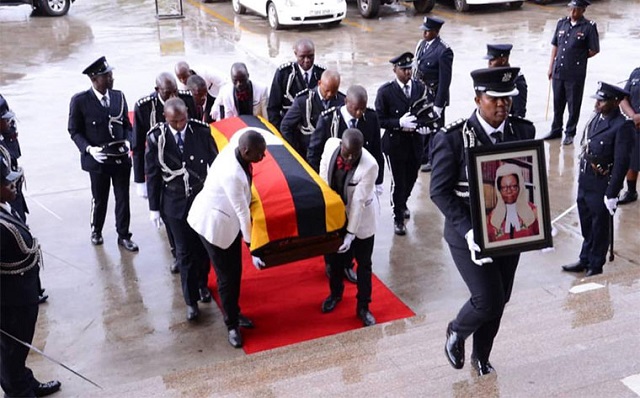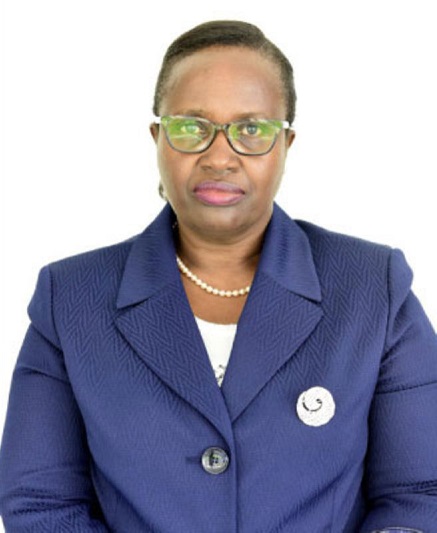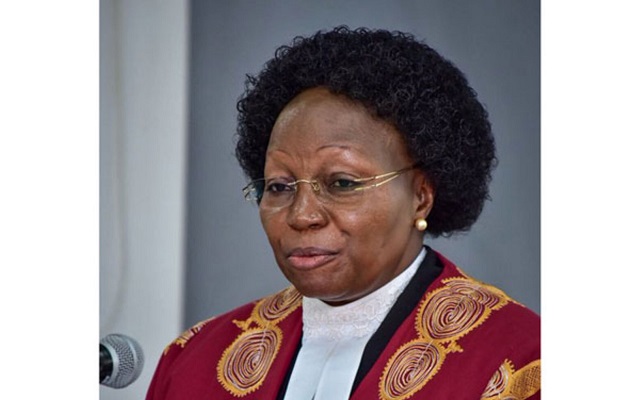
Why children come before spouse
COVER STORY | THE INDEPENDENT | The High Court in Kampala on June 27 ruled that the late Supreme Court Justice Mary Stella Arach Amoko be buried at Jukiya Hill Ward, Juba village in Nebbi District in northwestern Uganda without any disturbance in accordance with the customary law of the Ker Kwaro Kaal Jonam.
It was the conclusion of a case in which her three children, her brother and her sister had petitioned court to block her husband, Ambassador Idule Amoko from receiving, transporting and burying the body of the late Arach-Amoko to Arra Parish, Pachara Sub- County, in Adjumani District.
The deceased died on June 17 at Nakasero Hospital in Kampala and was accorded a state funeral by the government.
In the ruling, the court presided over by Justice Ketra Katunguka said the late Arach Amoko is entitled to her culture even in death.
“She is entitled to be buried according to the culture and customs of the Jonam people in the Ragem chiefdom in Nebbi District,” she ruled.
She added that since the children of the late Justice Stella Arach Amoko have their home in Nebbi where together with her they used to call home, it is prudent that she be buried near/at the said home.
The children, sister and brother had argued that the late Arach-Amoko, being the grandchild of Chief (Rwot) Dacaunder Kaal Ker Kwaro Jonam Kapita tribe, culturally could only be buried on the Royal grounds at Kaal Ragem in Pakwach District and in accordance with and observation of the Ragem culture and customs.
They said, however, prior to her death the deceased opted to be buried next to her late father at her family compound or ancestral burial ground at Jukiya Hill Ward, Juba village, in Nebbi District. They said she communicated this position to family members and summoned her brother, Godfrey Picho, on June 12, 2023 and categorically and unequivocally communicated this position to him.
According to them, the deceased owned a home at Jukiya Hill Juba Ward Nebbi District where she wished to be buried which is an extension of the Royal burial grounds. The deceased personally purchased an extension to this land for purposes of establishing a home in preparation of her final resting place.
“As a princess, the deceased will not be the first female to be buried at her family burial ground instead of her husband’s home; because her aunt Julia Angeyo next to whom the late justice Stella Arach wished to be buried is buried there.
“The only way a princess can be buried elsewhere is if her husband is also a royal,” they said.
The late Arach-Amoko’s widower, Ambassador Amoko argued that they were married and at no point during the 27 years of their marriage did the deceased verbally, or in writing, express to him any desire to be buried at Jukiya Hill Ward in Nebbi District or not to be buried at Araa in Adjumani District where he hails.
Amoko argued that it is a notorious, religious and cultural custom among the Madi to which community he belongs, that a woman who is deceased is buried in the burial grounds of the family where she is married in proximity with her spouse.
The late Arach Amoko’s sister, Christine Onyok told court in a sworn affidavit that as the deceased’s sister, caretaker and next of kin, she witnessed how the deceased did not have a cordial and happy relationship with her husband. She said Amoko did not take care of the deceased while she was admitted in hospital and at no time did he spend a single night at the hospital with the deceased but only paid brief casual visits.
“Whenever the First respondent (Amoko) visited the deceased, he neither spoke to her and nor did the deceased want to speak to him,” she said.
Some of the cases, such as Namusoke Annet Kiwanuka vs Eva Amuge & 2 Others HCMC No.4/2023 and Kyobe Julius Luseleka & 5 Others V. Aida Namalwa No. 167 of 2021) were cited in the arguments by lawyers for and against.
The ruling
In her ruling, Justice Katunguka said she considered the submissions of both sides to resolve the main issues of the rights of the bereaved spouse and end the cultural rights/obligations regarding the burial.
She said in her considered view that when courts have to decide burial matters and taking into account all the parties involved, they must be cautious as these matters are sensitive in nature, because of grief, tragedy and loss of their loved one; made worse also by the failure to bury the deceased in time; court must consider the expectations of the community; the relationship between the deceased (whilst still alive) and the persons disputing the spouse, fairness and reasonableness of such decision, proper respect and decency and the need to save family relationships.
She said the main question were: Did the deceased express her wish as to where she should be buried? Should the wishes of the deceased on where she wanted to be buried be overtaken by her husband’s cultural practices? Should the late Justice Stella Arach Amoko be buried according to her custom?
She dwelt on the question whether the deceased had no right to choose a burial place simply because she was married to a Madi and can only be buried at the husband’s ancestral home and any other way has to be cleared by the husband and his clan.
“There is no express law governing burial disputes especially for persons who die intestate,” she said. She added, however, that position of the law that the High Court has the power to intervene in order to resolve disputes as to who is to undertake the task of disposing of the body and as to the manner and place of disposition.
“Where like in this case the family members of the deceased fail to agree on the place of burial where they can lay the deceased in a dignified manner, court has no option but to step in,” she said.

Ruling on specific questions, Justice Katunguka said: “I would answer in the affirmative the questions ‘Did the deceased express her wish as to where she should be buried? And is that wish that led to the consensus?”
“It would appear to me that decision to bury a person in one place and not the other is informed by the emotional need for preservation of family ties that existed immediately before death,” she said.
She said unlike other jurisdictions where the culture of burial in cemeteries is practiced; the practice in most societies in Uganda is for people to be buried at or near the family home; in some cultures the ancestral home and in others the home where the deceased had chosen to call home.
“I believe the burial place is as near home as possible to allow family members to heal but also not to completely forget their loved one; to continue the ancestral thread by recounting to the future generations in relation to the deceased,” she said.
Cases relied on
She said she considered the decisions of court in other cases relied upon by the lawyers in their argument. These included the case of Namusoke Annet Kiwanuka vs Amuge (supra) where the ‘widow was claiming the body of her husband against another ‘widow’ together with the deceased’s relatives.
The court found that none of the ‘widows’ was married to the deceased and gave the body to the deceased’s mother.
In another case of Kyobe Julius Luseleka & Ors vs Aida Namalwa(supra), where the relatives of the deceased were claiming the body of their deceased relative from his widow; court decided in favour of the widow.
While in Jovia Matsiko vs Emmanuel Wandera MC 141/2021 where the mother of the deceased was claiming the body of her daughter from the deceased daughter’s husband; court decided that the mother and the relatives had no right.
She said in all cases where the parents, siblings or the clan are challenging a spouse over who should determine where a deceased person should be buried; “the pre-eminent status of a spouse over others concerning her/his deceased spouse was upheld.”
She said, however, the Arach-Amoko case was different because it was the children of the deceased. Justice Katunguka added that this case was different because the children were not the Ambassador Amoko’s children.
“The relationship between the applicants and the deceased is natural and organic and is still growing through grandchildren,” she said, “while with the 1st respondent (Ambassador Amoko) the relationship with the deceased has come to an end since there are no biological children birthed between them.”
“Therefore the issues of the children of the deceased must be taken into account in determining the burial place of the deceased,” she said.
She referred to another recent prominent case of Nice Bitarabeho Kasango vs Rose Kabise Eseza MC No. 17/2021. In this case, the relatives of the late Bob Kasango wanted him buried in Tororo as opposed to his wish according to his spouse.
She quoted the court’s ruling that the late Bob Kasango’s wife and children had never been to Tororo, were taught or told nothing about Tororo or Jopadhola culture by the deceased and merely knew or interacted with the Tororo relatives of the deceased at his behest.
On the other hand, they have severally visited Fort Portal as their village, spent time there with the deceased, and are aware that the deceased desired that Fort Portal be their country home and burial place.
The court noted that it had verified from Samora Kasango, the eldest son of the deceased, who confirmed all these claims and explained that their desire as children is to bury their deceased father on their family land in Fort Portal.
“I find the spirit in that case similar to the case at hand,” Justice Katunguka said.
“The combination of factors tilt the preference for the deceased to be buried in Nebbi according to her wishes,” she finally ruled.
Culture and the law
The ruling in this case appears to place on firm ground the current practice that culturally bind where surviving husband decides where to bury his dead wife.

In this aspect, some commentators have referred this case to Kenyan case of S.M. Otieno, whose death and burial caused a long-fought legal battle between the widow and her late husband’s brother and clan.
The Kenyan Court of Appeal ruled that when there was conflict between common law and customary law, customary law is given precedent provided that such laws are “not repugnant to justice and morality.” Otieno was buried at his ancestral home against the wish of his widow.
On the question of culture and custom, Justice Katunguka noted that in all cases where there is a dispute as to the burial place of the deceased, consideration should be given to cultural, spiritual and religious factors, where such factors are present.
She noted that the late Arach Amoko was a princess with a title of `Nyakwar Rwot Daca Mary Stella Arach’ and that there were passage rites that are meant to be performed at the burial of the deceased which customs can only be conducted at the ancestral burial grounds located at Jukiya Hill Ward in Nebbi District—an extension land of the royal grounds at Kaal Ragen in Pakwach district.
Justice Katunguka ruled: “The late Justice Stella Arach Amoko is entitled to her culture even in death; and she is entitled to be buried according to the culture and customs of the Jonam people in the Ragem chiefdom in Nebbi District; Since the children of the late Justice Stella Arach Amoko have their home in Nebbi where together with her they used to call home it is prudent that she be buried near/at the said home.”
Other cases
Another dispute cited in this case was that between the family of the late Christopher Mayanja Kyobe and his widow, Aida Namalwa, on where he should be buried.
Christopher Kyobe had died of Covid in Switzerland and his wife of 28 years brought his body back from Switzerland where they had lived, because she said he had told her that he wished to be buried at his matrimonial home in Mukono. But his birth family said he should be buried at the family’s ancestral burial grounds at Bamunanika in Luweero District where his own father was buried. They said burial was a cultural affair, based on traditions, norms and customs that are protected and promoted by law including the constitution.
The judge noted that under the law, a widower or widow was the ‘most entitled’ to apply for the power to administer the deceased’s estate. The right to culture was not an ‘absolute right’ or one that allowed no deviation, she said.
“Traditions, custom and norms that deny a widow ([the) right to determine how her deceased husband should be buried’ were inconsistent with the equality provisions of the constitution, and were thus oppressive and discriminatory,” she said.
Justice Alice Komuhangi Khauka ruled that upon marriage, men and women are expected to live independently and exclusively of any other persons, including their parents. She ruled in favour of the widow.
Another case was that of the late Isaac Omaset Ekwaro Alias Ekirapa Moses Nyapidi who died in Canada in 2022. A woman, Namusoke Annet Kiwanuka said she was the widow and wanted to bury him at their matrimonial home at Lukyamu Village, Tweyanze Parish, Katikamu Sub-County, Luweero District.
She was opposed by another woman who said she was the first wife of the deceased and lived with the deceased in Canada and wanted him buried at Kachaboi Village, Kachumbala Sub County, Bukedea District.
The family brought in the vice chairperson of the katekok luk’epikist luk emojong clan who said, according to their customs, the deceased had to be buried in Kwapa because his father, grandfather, and siblings had been buried in Kwapa.
The judge said when dealing with burial disputes, the court will consider the following factors; the deceased’s wishes, the reasonable requirements and wishes of the family and friends who are left to grieve, the place the deceased was most closely connected with, and ensuring that the body is disposed of with respect and without delay. The court awarded the right to bury to the mother.
 The Independent Uganda: You get the Truth we Pay the Price
The Independent Uganda: You get the Truth we Pay the Price



